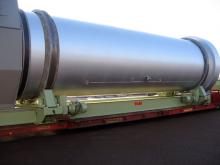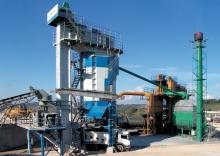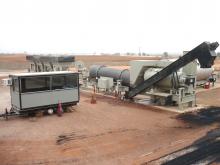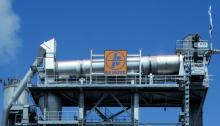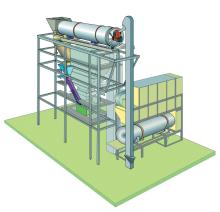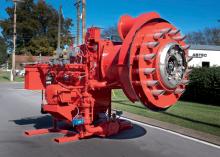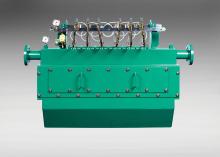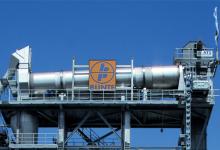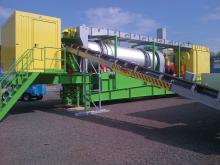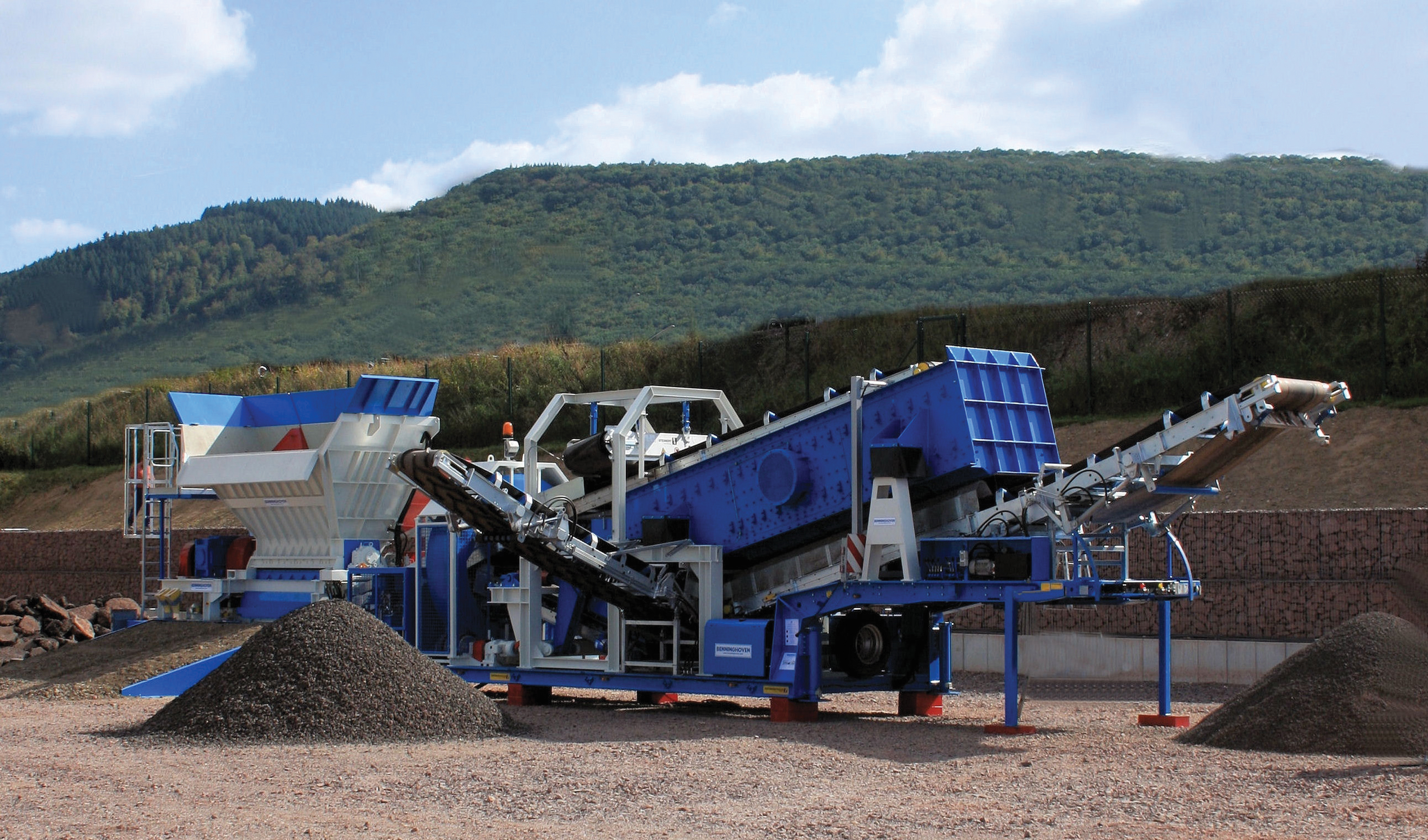
Manufacturers are producing innovative asphalt equipment, and operators are benefiting from this as Patrick Smithreports
Asphalt plant manufacturers and operators are understandably placing great emphasis on higher productivity but with lower costs. At the same time they are aware of environmental issues and the ever-increasing use of recycled material in mixes.And because of this a wide variety of new and innovative equipment is coming to the market as are new energy-reducing asphalt recipes.
According to the
"One possibility is to offer high-quality asphalt that can be mixed and installed at lower temperatures. Lowering the temperature also achieves significant savings in fuel consumption, considering that around 50% of production energy is consumed by heating the asphalt," says Ammann.
"There are various available methods for producing low-temperature asphalt including the use of additives or special binding agents as well as using foamed bitumen and modified mixing cycles. It is also possible to combine these methods.
"It is usually possible to lower the asphalt temperature by at least 20°C and sometimes by as much as 70°C or more." The company says the use of foamed bitumen is a suitable method of reducing the temperature as it is easier to mix with hot aggregate.
"The basic principle behind the production of foamed bitumen is as simple as it is ingenious: cold water is injected into the flowing mass of 150°C bitumen.
"The water is immediately heated above boiling point and evaporates in part. The result a mix of steam, water and bitumen. This mix is injected into the asphalt mixer. The use of foamed bitumen allows the temperature of the aggregate, and therefore that of the asphalt, to be reduced by approximately 60°C with no loss of quality." Ammann points out that a rule of thumb says that reducing the asphalt temperature by 10°C cuts the emissions on the construction site by half, while the asphalt can be installed using the normal machines.
In 2010, the Hans Weibel company laid 1,500tonnes of low-temperature asphalt on the basis of the WAM FoamR process on the busy cantonal road near Koppigen in the Swiss region of Emmental.
The ACT 22 N W-ecophaltR that was used was installed as a base and wearing course and the asphalt was produced 40km away in Oberwangen.
The Ammann Universal NG 320 asphalt mixing plant with warm reclaimed asphalt feed has a dual-row mixing tower; a four-tonne Amix mixer and a foamed bitumen installation for the production of low-temperature asphalt.
"The advantages of using the new kind of asphalt became apparent as soon as installation started: it reached the construction site at a temperature of around 110°C and was compacted using an AV 95-2 at temperatures below 80°C," added Ammann.ENHANCED SYSTEM
"With up to 544tonnes/hour production capacities, the system can be packaged with a new plant sale or installed on existing unitised counterflow, parallel flow or rotary mixers. This system can be installed on virtually any asphalt plant manufacturer's design in addition to Terex asphalt plants," says Terex.
Enhancements found on the system include an auto-fill tank with high/low level gauges.
Once water inside the 832.8litre tank reaches a prescribed low point, the plant controls automatically turn on water flow to refill the tank, so the plant can continue to make warm mix asphalt without stopping. The system's water meter includes a no flow indicator to alert the plant operator of water flow restrictions when making warm mix.
A system is also offered for asphalt operations that take advantage of producing warm mix asphalt in colder temperatures, while a special expansion process allows the foamed binder to "more readily coat the aggregate at lower mixing temperatures than when produced as traditional hot mix asphalt (HMA)." If required, the unit comes complete with a programmable logic control (PLC) installed in the control panel, allowing the warm mix system to operate as a stand-alone unit.
Indeed, at
It features a high-speed computer processor and Windows operating system, and delivers automatic proportioning of all mix materials, automatic sequencing of mix start-up and automatic burner control to optimise plant efficiency and reduce mix costs.
"Plant operators input mix recipes using screen menus or quickly import mix designs from Excel spreadsheets and can assign a specific name to each mix. Impulse II stores virtually an unlimited number of mix designs on the computer's internal hard drive. Operators can quickly switch from one mix design to another using a screen menu to select a specific stored mix," says Terex.TOP TOWER 3000
These issues were developed at the request of its customers and in synergy with those customers and also following various suggestions.
In recent years the percentage of milled material used in plants has increased, and it was decided to adopt various measures to facilitate the use of such material and increase the usable quantity.
For example, on the Top Tower 3000, the slides were improved and made more vertical where material could become clogged. They were also heated with electric elements, meaning that the sheet metal where the material slides is hot at the start of the production (in order to avoid the creation of thermal shock which leads to the clogging of recycled material).
Kits were also prepared to improve cleaning operations.
"Ladders, platforms, access gangways at the opening points of the various covers, side hatches which open up to the various hoppers under screens: all allow the operators to be able to carry out the necessary maintenance operations with maximum accessibility and safety," says Marini.
"The position of the pre-separator screw was also changed to facilitate maintenance operations, and the capacity of the recovered fine material storage hopper was increased.
"The great attention of Marini to ecological aspects and operational economy is demonstrated in the dryer-burner, which is equipped with a dedicated compressor in order to increase vaporisation of the fuel with consequent optimisation of consumption and emissions." The company says evolution was the key word for its R&D Office recently. To give maximum flexibility to the customer based on job site needs, the components of motive power in the cab can be prepared with standard electrical connections or the cabinets can be placed directly on the various units with simplified wiring using Profi-bus technology (particularly suited for those plants which must be moved several times during their operational lives in that the electrical wiring operations are made easier).
ASPHALT RECYCLING
"The use of asphalt recycling is not only subject to economic constraints but also to the statutory provisions for waste management in order to preserve valuable resources," says Benninghoven.
"Impact and raw crushers were primarily developed for material such as hard rock and concrete demolition. Therefore, a high energy input is inevitable for the crushing process, leading to fragmentation of the aggregates within the reclaimed asphalt and a huge amount of fines is unavoidable." The company says that to achieve the end product grading, large quantities of virgin rock must be added, while fine grained material in the crushed asphalt absorbs large quantities of water, causing increased costs in the drying process.
"In developing a machine the main criteria for Benninghoven's R&D team was to design a granulator capable of breaking reclaimed asphalt blocks and planings down to a perfect recyclable size without reducing the original stone content, and to handle trapped steel without damaging the equipment.
"The BRG 2000 is capable of sizing one or two fractions and can process up to 200tonnes/hour.
In its mobile version, the compact unit allows for quick set up times, and for revelant small quantites of material to be processed economically." On the machine, the primary crusher is fed by wheeled loader and slabs up to 1,800mm long can be used. Hydraulically-powered arms press the material onto the single rotating grinding rotor where the cutting teeth act against the adjustable crusher camber bar to break down the feed material.
The speed of the shaft is controlled electronically, ensuring a consistent feed, and a spring-mounted breaker bar allows the passage of trapped metal to be removed by a magnetic separator.
The material, pre-crushed to around 0-60 mm, is transferred onto a belt which feeds a highcapacity vibrating screen which sizes finished products (0-8mm and 8-22mm). The oversize is re-crushed in the twin shaft BZG 1200 rotor granulator.
The required final size is obtained by variable adjustment of the gap between rotors.
"The material is handled gently so that the original grain structure of the aggregates is not destroyed during processing and only limited grit and dust are produced," says Benninghoven
Simge Group's plant export
TURKISH ASPHALT equipment manufacturer
E-Mak was established to manufacture machinery required by Simge Group companies, and has developed innovative products. These include the Simge Challenger (a closed aggregate crushing, sieving, stocking and feeding system that can be integrated into asphalt plants, and which it is claimed reduces fuel consumption and CO2 emissions during asphalt production), and its RATech (Asphalt Recycling Technology) for hot asphalt recycling "which is completely different from existing technologies." The export of the high-capacity plant to the AMW-HTV Group of Companies is being carried out on a turnkey basis and in three phases.
"For the first time a Turkish company has exported to Germany its asphalt technology."
To date we have exported a large number of asphalt production plants to the Middle East, Africa, the Balkans and the middle-Asian countries," noted Nezir Gencer, chairman of the board of directors of the Simge Group at an agreement signing ceremony held in Lensahn in the German province of Schleswig- Holstein. Also present were the Turkish Consulate General of the Trade Attaché Sevket Ilgaç and Peter Stamer, owner of AMW-HTV.
Within the framework of an agreement, originally reached at the

